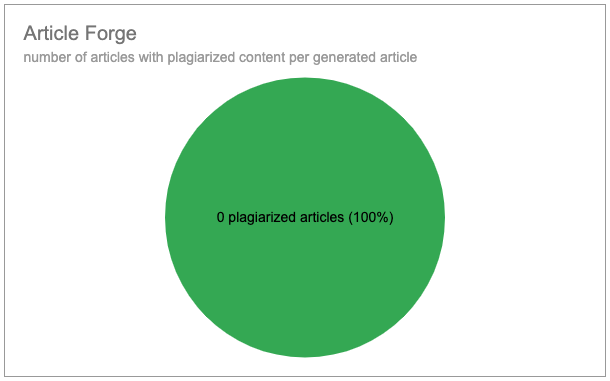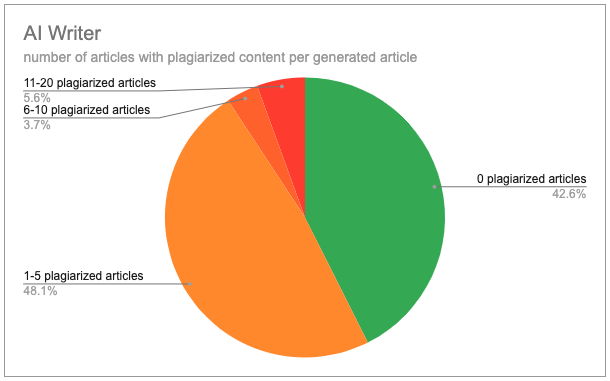AI Writer vs. Article Forge Comparison

| Tool | Content Quality (out of 5) | Uniqueness | How is Content Created? | Topic Coverage | Speed (words per second) | User Experience (out of 5) | Price |
|---|---|---|---|---|---|---|---|
| 1. Article Forge | 3.09 | 100% | AI/Deep Learning Models | 100% | 5.84 | 5 | $57/mo - unlimited articles |
| 2. AI Writer | 2.47 | 42.60% | Scraping & Spinning + AI/NLP | 77.8% | 4.85 | 4 | $49/mo - 120 articles |
Introduction
For an earlier post, we ran a series of data-backed tests on the top five tools in the automated SEO content generation industry to determine which tool is the best. You can find that post here.
That post covered the five biggest text generation tools (including Article Forge and AI Writer) in a series of seven separate categories. Because of the sheer amount of data in those studies, the post got quite long, so we decided to compare Article Forge and AI Writer directly so we could go more in-depth about each tool.
How we set up the Tests
To properly compare the best content generators, we needed a proper dataset. So, we created a list of 54 keywords that covered a full range of short tail and long-tail topics. We then generated articles for each of those keywords using each of the tools to create the dataset for our tests.
The tests and analyses we ran cover the following seven categories: overall content quality, uniqueness, how the tools create content, speed, user experience, topic coverage, and price. Below are the results of each of the tests.
Content Quality
Content quality is arguably the single most important factor in deciding to use an automated article creation tool instead of writing or buying content. However, it is difficult to get a good idea about the overall quality of a tool when looking at only a few sample articles. So, we decided to run two studies using the articles we generated with AI Writer and Article Forge.
For the first study, we asked participants to rate articles from 1 to 5 based on the following criteria: relevance to the given keyword, flow of the article, overall readability, syntax, factual accuracy, completeness of the article etc. Article Forge received an average grade of 3.09/5 while AI Writer received a 2.47/5. Our tests indicated that anything below a score of 2.0 was unusable, even as tier 2 content. Scores between 2 and 3 would require major revisions before they could be used on a tier 1 or tier 2 property. A score between 3 and 3.5 could be used on a tier 1 property or even money site with a few edits.
For the second test, we had participants compare side by side articles (without telling them where the articles came from) and decide which article was higher quality (based on the same criteria as the first test). In the side by side comparison, participants preferred Article Forge’s automated content 120% over AI Writer’s.
Uniqueness
Uniqueness has long been considered one of the most important factors Google uses to decide if content should rank so in theory both tools should be delivering content that is completely unique and does not contain any duplicate content.
When testing the articles with CopyScape, every single Article Forge article came back completely unique while the same could not be said for AI Writer. Contrary to the claims of uniqueness on their site, only 44.5% of AI Writer’s articles came back completely unique.
To dig a bit deeper into the data, of the AI Writer articles that were not completely unique, many articles had multiple instances of duplicate content. Below is a chart detailing the overall number of plagiarized articles per AI Writer article:


How the articles are made
In the past, machine written articles have come from scraping content from existing articles and spinning the plagiarized text to make it appear unique. This method is called “scraping and spinning” and is a dangerous SEO technique, according to Google. With the rise in popularity and (more importantly) potential of artificial intelligence (AI), some tools, including Article Forge and AI Writer claim to be using more advanced technology than the traditional “scraping and spinning” method.
When looking at AI Writer content, it is clear that they are still using the scraping and spinning method for two main reasons: 1) many of their articles contain duplicate content from multiple other articles 2) they list some of the URLs where they got information. While scraping may be the first step in AI Writer’ process, it is definitely possible that once the content is scraped, there are AI models or other algorithms intelligently selecting what sentences to use and ordering them in a logical way.
When looking at Article Forge content, it is pretty easily apparent that they are not using the scrape and spin method. For one, their content is consistently completely unique. Beyond that, the articles read and flow naturally (unlike the abrupt transitions that often exist when a tool is scraping and spinning content), and were rated the highest by the quality study participants. These factors indicate that Article Forge is using some sort of deep learning or neural network to write content.
Topic coverage (can it write about any niche)
Topic coverage is arguably as important as the overall quality of the content because if the tool cannot write about your niche or topic, then the quality might as well be zero. But unlike overall quality, topic coverage is much easier to gauge. In order to determine if these tools can write about any topic, we ran two tests: the first was to simply see if the tools could generate an article for every keyword provided.
Both Article Forge and AI Writer were able to generate articles for all keywords provided.
This was a good sign (as not all tools can generate content about all topics), but the second test dug a bit deeper and looked for whether or not the articles actually contained the keyword.
Article Forge articles contained the keyword 100% of the time while AI Writer articles contained the keyword only 77.8% of the time.
Speed
When testing the speed of each tool, we started timing when we entered the keyword, and stopped timing when we had the resulting article. Both AI Writer and Article Forge have very simple setup processes so this only took a fraction of the total time.
It is important to note that AI Writer does not give you the option to choose how long the article will be (the articles are generally between 500 and 800 words) while Article Forge does. So in order to make the test as fair as possible, we set Article Forge to the longest article setting.
The average time to return an AI Writer article was 2 minutes 52 seconds while Article Forge took an average of 2 minutes 2 seconds.
This seems like quite a time difference, so we also broke down the speed into words per second to make sure longer articles weren’t given an unfair disadvantage. Article Forge wrote at an average rate of 5.84 words per second while AI Writer wrote at an average rate of 4.85 words per second.
While Article Forge delivers articles 29.1% faster than AI Writer, it only writes 17% more words per second.
User experience/ease of use of the tool
Both Article Forge and AI Writer are web-based tools that have extremely intuitive workflows.
AI Writer earned a 4 out of 5 because it has an extremely simple process where all you have to do is enter a keyword, topic, or headline (up to 65 characters) and click “Write Article”. It did not receive a 5 out of 5 because the only feature AI Writer includes with its text generator is the option to receive a “research-focused” article. Essentially, this option does not attempt to spin or reword the content it scrapes and gives you a series of sentences and links to the sites where they came from so you can write your own article.
Article Forge earned a 5 out of 5 because it gives you more control over the articles by allowing you to enter keywords and sub-keywords (to provide more context for your article), choose the article length, and add titles, images, videos and even links automatically. However, none of the settings are required to generate an article so you could simply add a keyword and “Create New Article” for an extremely streamlined process.
Article Forge also includes more features like a bulk article generator which allows you to create multiple articles at a time and a post scheduler that allows you to automatically post articles to your WordPress blogs.
Both tools offer API access so that you can add content creation to any of your SEO pipelines.
Price
Article Forge has two subscription pricing options: a Monthly plan which is $57/month and a Yearly plan which is $324/year. Both of these plans allow you to create unlimited articles.
AI Writer has two public subscription pricing options: a $19/month option that includes one user and 40 “computing units”, and a $19/month option that includes one user and 120 “computing units”. There is also a higher tier plan that requires contacting them for more information. From AI Writer’s definition, “computing units” are credits that you use to generate articles. In order to get more computing units, you have to cancel your current plan and resubscribe to a higher plan.
| Tool | Content Quality (out of 5) | Uniqueness | How is Content Created? | Topic Coverage | Speed (words per second) | User Experience (out of 5) | Price |
|---|---|---|---|---|---|---|---|
| 1. Article Forge | 3.09 | 100% | AI/Deep Learning Models | 100% | 5.84 | 5 | $57/mo - unlimited articles |
| 2. AI Writer | 2.47 | 42.60% | Scraping & Spinning + AI/NLP | 77.8% | 4.85 | 4 | $49/mo - 120 articles |
Overall grade and takeaways
Overall, Article Forge is the clear winner in the following categories:
- Content quality
- Uniqueness
- Topic coverage/relevancy
- Speed
But, AI Writer does create slightly longer content that could definitely be usable with some major edits and is cheaper than Article Forge (if you need less than 120 pieces of content per month).
When judging user experience, both tools have a very simple process but Article Forge has an edge because it includes more features and extended functionality compared to AI Writer.
The most important takeaway is that Article Forge content was deemed higher quality in both the overall quality rating study and the side by side comparison study. This is likely due to the fact that Article Forge is using deep learning and other AI technology to write articles when AI Writer is getting the vast majority of its content from scraping.

